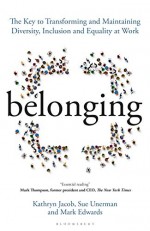Extreme ownership by everyone is essential for success in terms of both Digital Transformation and a true culture of Belonging.
There are two items to prioritise for most businesses in 2021. The pandemic has given added importance to both.
- Digital transformation, in light of the fact that excellent delivery of goods and services via digital is obviously a game changer for every business in lockdown.
- Belonging, because having a better and kinder culture in every workplace, while always important for the well-being of employees, is even more crucial when we are working remotely (and will continue to be as we reinvent the office for blended working).
They might seem very different issues, but there is one significant differentiator to the success or failure of them both across business. This is that everyone needs to take ownership, not just specialist teams.
Let’s start with Digital Transformation. Ashley Friedlein, founder and president of Econsultancy, comments that business must “Double-down on Digital Transformation. He goes on “Digital transformation is a mega trend that I’ve covered previously.. whilst far from new, the Coronavirus pandemic has given the need for digital transformation a new urgency, that for many businesses, is existential.”
Ashely and I have the shared experience of being part of the Government Digital Advisory Board when GDS (Government Digital Service who created and run gov.uk) was run by Mike Bracken and many of the team who now work at Public Digital helping government around the world with digital transformation. His book “Digital Transformation at scale: why the strategy is delivery” written with Tom Loosemore, Ben Terrett and Andrew Greenway, is endorsed by Malcolm Turnbull who points out that dealing with government online “should be as easy as ordering from Amazon”. That’s not a bad benchmark for every digital interaction that we have at work. Is every digital interaction by you, your employees and your clients and customers that easy, user friendly and instinctive?
One of the key issues described in the book in achieving this is the problem of leaders who don’t think that this is their job and are unconcerned with the impact of technology on everything that they do. “They set a cultural expectation that tech is no more than a question of plumbing… that can be ignored while the ‘grown-ups’ deal with the real strategic issues.” Of course, the impact of tech on everything is the real strategic issue. Businesses need a great CDO to lead. But silo-ing the impact of tech on everything to that CDO only and their department can be severely limiting. Instead every leader in the organisation needs responsibility and vision for digital transformation.
The same is absolutely true of the other top agenda item Belonging. Culture is the beginning and end of best practice in business.
With a culture of Belonging you will retain great people
With a culture of Belonging you will reap the benefits of diversity
With a culture of Belonging you will recruit people who will make your culture even better
Belonging doesn’t just happen however – it needs work and leadership from the top, but also from every seat, particularly during lockdown, with remote working, and when blended working becomes the norm.
A great head of diversity and inclusion, or a brilliant chief people officer is useful and essential. But silo-ing the effort of creating a culture and behaviours of Belonging to them and their department is severely limiting. Every leader in the organisation needs responsibility and vision in this respect. And in respect of a culture of Belonging there is a leader in every seat in the organisation.
Specialist leads have their crucial value, but to achieve true transformation you need everyone to take extreme ownership responsibility for change.



The unexpected impact of football without crowds
Tuesday, February 16th, 2021The inability to fill stadia with fans has had a terrible economic impact on clubs of all sizes. However the lack of fans may have had another effect too. This season there is less of a divide between how the top teams are doing at, well, the top, and how the rest of the pack is faring.
Lowly placed Burnley ended Liverpool’s 68-match unbeaten home run and bottom-placed Sheffield United beat title-challenging Manchester United at Old Trafford.
These performances together with transformations like John Stones’ metamorphosis from an erratic, often-criticised performer to being arguably the best English centre-back in the league raise the question: Is the lack of a jeering opposition crowd boosting some players’ performance?
We do know, from a famous behavioural economics experiment, that the absence of a crowd means referees make better decisions. Tobias Moskowitz and Jon Wertheim in their book Scorecasting, look at common behavioural biases that effect the outcome of sports games.
The authors prove statistically that referees make different decisions depending on the crowd.
“We’ve found is that officials are biased, confirming years of fans’ conspiracy theories. But they’re biased not against louts screaming unprintable epithets at them. They’re biased for them, and the bigger the crowd, the worse the bias. In fact, officials’ bias is the most significant contributor to home field advantage.”
In the current lockdown are we seeing the effect of the missing crowds on how teams play?
What if top clubs pay big bucks to top flight players mainly because they are better at dealing with the stress of a hostile crowd or the pressure of expectations from the home crowd and not because they are actually more skilful?
It is obviously very intimidating to face a top team’s loyal fans if you are on the opposing team. Or the jeers of a misstep from your home crowd. A bit like a talented team member in the office who has to face constant banter or micro-aggressions for being different.
If you eliminate this unnecessary pressure you allow talent and skill to rise. You enable everyone to contribute.
This is why when the workplace has a culture of belonging for everyone, not just a single cultural fit, you get better decisions, better work and better talent.
When I was interviewing people for our new book one top creative told me that for much of her career she has felt embattled: “Usually a battle against white masculine privilege. When can I breathe out?”.
Another top ad exec told me that when they joined the industry they felt that they had gone back in time to a culture more prevalent in the last century.
We can change our sector. We can make the workplace kinder and by doing so we will make it better. Of course, this takes active effort, as we explain in our book Belonging, the key to transforming and maintaining diversity, inclusion and equality at work. Active effort to antidote micro-aggressions with micro-affirmations. And active efforts from everyone in leadership to eliminate banter and unfairness. The new All In industry census launched by the Ad Association is crucial to building a better more inclusive workplace.
This kind of environment does not toughen people up. It reduces the ability for people to grow their skills and talent.
Let’s take a learning from the current culture experiment on the football field and allow creativity to rise.
Posted in MediaComment | No Comments »